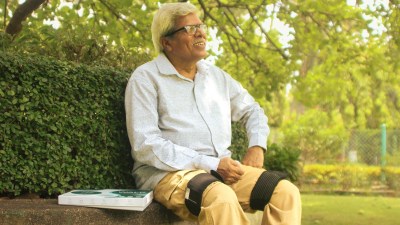The corporate conscience disabled
Each civilisation grows up with misconceptions, so we aren't any different from others. But we've got to change in one respect at least. ...

Each civilisation grows up with misconceptions, so we aren8217;t any different from others. But we8217;ve got to change in one respect at least. We8217;ve got to change the way we view the disabled. The last thing they deserve is charity, but how can generations that have come of age on the story of Shravankumar think otherwise? If you remember your Ramayana, or have read Gandhi8217;s autobiography, you8217;d know that Shravankumar was the model son who devoted his life to the care of his blind parents.
I don8217;t know how the disabled rights groups in the country would rewrite Valmiki8217;s Ramayana, but they8217;d certainly not like to paint the good son in the colours our ancient poet chose to. For, nothing can be more offending to the dignity of a disabled person than to be condemned to live off the handouts of others, no matter how noble their intentions may be. Disabled people don8217;t want our charity; they need jobs like all of us, and not a Shravankumar to carry their burden.
Yet we find evidence of the Shra-vankumar complex8217;everywhere. A study by the New Delhi-based National Centre for Promotion of Employment for Dis-abled People has reported that 61 of the nation8217;s top 100 corporates, with a collective workforce of over 6,25,000, employ just 2,190 disabled people.
That8217;s a piffling 0.35 per cent, four decades after the first employment exchange was set up in Mumbai exclusively for the disabled, 22 years after New Delhi made a 3 per cent reservation mandatory for the public sector, eight years after the 1991 National Sample Survey pegged the number of employable disabled people at seven million, three years after the Persons With Disabi-lities Act laid down that incentives be given to companies which set apart 5 per cent of jobs.
And all that Maneka Gandhi, our Minister of State for Social Justice and Empowerment, ca-n do is pack off the Disability Chief Com-missioner, the nation8217;s top civil servant responsible for seeing that the Act gets implemented, to Nagpur, two railway zones removed from the administrative ministriesresponsible for the making it happen.
We can8217;t expect a disabled government to have much time for the disabled, but where8217;s the much-advertised social conscience of India Inc? Just last year, the Confederation of Indian Industry st-retched its social agenda to include finding employment for the disabled as one of its objectives. The problem with corporate India, though, is that, tacharyyalike establishment India, it thrives on platitudes.
Not surprisingly, 20 of the 61 companies covered by the study don8217;t employ even one disabled person. These companies include big names like Castrol India workforce: 1,500, Colgate Palmolive 1,300, EID Parry 1,500, Eveready 4,700, and Bombay Dyeing 10,000. Two of these 20 National Aluminium Company and Mangalore Refineries and Petrochemicals, ironically, belong to the public sector, which was meant to implement a 3 per cent quota back in 1977! Even the corporates that give the disabled a token presence make a caricature of the Persons With Disabili-ties ActTISCO, for instance, has just eight disabled persons on its workforce of 60,205, which translates into 0.01 per cent; out of SAIL8217;s over 200,000 employees, just 653 or 0.32 per cent are disabled.
Imagine this is happening in a country whose army has three disabled serving generals, including two commanders 8212; Lt-General Vijay Oberoi, who heads the Army Training Command, despite losing one-half of a leg in the 1965 War, and Lt-General P. S. Joshi, who has just taken over as Commandant, College of Combat, Mhow, after being GOC, 12 Corps. At a less distinguished level, we have the example of the Titan factory at Hosur Tamil Nadu, where 169 of the 3,235-strong blue-collar workforce are disabled 33 are blind and yet engaged in a job assembling watches manually 8212; that requires a very high degree of hand-eye coordination.
Can8217;t corporate India learn from Titan? What8217;s more galling is the track record of the multinational corporations operating out of India. Their average is a laughable 0.05 per cent!Such figures would land their international principals in a whole lot of trouble in their countries of origin, but as we have seen in the case of the tobacco industry, when multinational corporations come to India, they conveniently turn their back on the laws that govern them elsewhere.
Germany has a 6 per cent quota that no government or corporate entity can dare to defy. In Japan, as well as Germany, employers who fail to fulfil the quota have to contribute to a compensation fund for the disabled. Which means they8217;re made to pick up the tab for the economic burden imposed by employable disabled people whom they fail to provide jobs for. That8217;s one example for us to follow, but can Maneka8217;s ministry do it?
In the three years since the Persons With Disabilities Act came into force, it hasn8217;t even initiated a dialogue with the three other administrative ministries 8212; Finance, Labour and Industry 8212; that can make Section 41 possible. Section 41, incidentally, promises incentives to companies whose disabledworkforce adds up to over 5 per cent.
So, we have a chicken-and-egg situation in our hands 8212; companies won8217;t get moving unless the incentives are in place, but for the incentives to happen, there has to be an officer in place to get the machinery moving. With the Disability Chief Commissioner packing up his bags for Nagpur, the noblest sentiment expressed in the noble-sounding Act may just bypass this century8217;s last Budget. So, our disabled population is fated to enter the new millennium waiting for their own Shravankumars. It8217;s a high price to pay for a nation that doesn8217;t have a social security net, despite Amartya Sen.
- 01
- 02
- 03
- 04
- 05






























